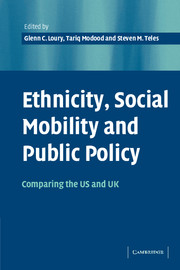Book contents
- Frontmatter
- Contents
- List of figures
- List of tables
- List of contributors
- Acknowledgements
- Introduction
- Part I Historical overviews
- 1 Ruling an empire, governing a multinational state: the impact of Britain's historical legacy on the ethno-racial regime
- 2 American diversity and the 2000 census
- 3 Four modes of ethno-somatic stratification: the experience of Blacks in Europe and the Americas
- Part II Informal social networks
- Part III Formal structures
- Part IV Political institutions and processes
- Part V Normative analysis
- Author index
- Subject index
- References
2 - American diversity and the 2000 census
Published online by Cambridge University Press: 22 September 2009
- Frontmatter
- Contents
- List of figures
- List of tables
- List of contributors
- Acknowledgements
- Introduction
- Part I Historical overviews
- 1 Ruling an empire, governing a multinational state: the impact of Britain's historical legacy on the ethno-racial regime
- 2 American diversity and the 2000 census
- 3 Four modes of ethno-somatic stratification: the experience of Blacks in Europe and the Americas
- Part II Informal social networks
- Part III Formal structures
- Part IV Political institutions and processes
- Part V Normative analysis
- Author index
- Subject index
- References
Summary
The census is not the only way to enter into the problems of American diversity, and may not be the best way, but it clearly provides the most authoritative information on the enormous range of races and peoples and ethnicities that make up the American people. It tells us a great deal about their economic situation, their educational progress, the way they are distributed spatially, the degree of their segregation or separation from others, who they marry, and how they conceive their race and ancestry. It is not information that is unaffected by political considerations. The census is directed by an official appointed by the President of the United States – a political appointee – but generally one with some competence in the issues that the census deals with, and his staff is a professionally qualified one. Congress will also get into the act of directing the census. And shaped as it is by politics, the census will also in return shape how Americans see and interpret their diversity. But most important, the census tells us how Americans conceptualize their diversity, and how their views of this diversity and its significance change over time.
- Type
- Chapter
- Information
- Ethnicity, Social Mobility, and Public PolicyComparing the USA and UK, pp. 50 - 66Publisher: Cambridge University PressPrint publication year: 2005
References
- 1
- Cited by

